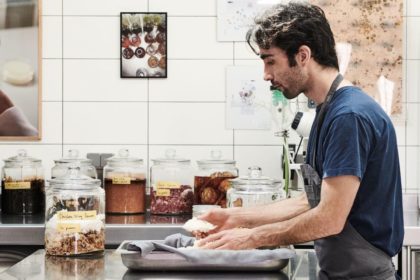
While more chefs and cooking enthusiasts are experimenting with fermentation, they’re skipping the basics and jumping straight to complicated dishes. The foundational steps of cooking are fine-tuned only with time and patience, with hours spent mastering the simple recipes first, according to Jason White, director of the fermentation lab at Noma restaurant.
“It’s just as important for you to make a delicious pickle and a wonderfully balanced kombucha as it is for you to make an incredibly long-aged batch of miso,” White says. “We can never forget that, whenever we start approaching these biological processes and these fermentation processes, that we also take advantage of the beginning stages of learning each individual step along the way. I can’t tell you how important it is for a person who’s emerging into the art of fermentation to stop and pause for a minute and take the opportunity to connect dots. Each microbe that we’re using to ferment things has some kind of mechanism, and an ingredient that we’re going to ferment has a composition that benefits that microbe.”
White spoke at Harvard University’s Science & Cooking Lecture Series, on the topic Fermentation: A Springboard for Modern Gastronomy. He began his director role at Noma last year and has since helped the world-famous restaurant earn its third Michelin star in September.
In his lecture, White stressed observational skills — honed in the early years of learning to ferment — are one of the most important qualities for a fermenter. The best way to “really understand what an ingredient is and what it has to offer a microbe” is through the senses. When you cut into the ingredient, does it feel dry? Does it smell of essential oils? Does it taste overripe?
“Fermentation is one of those weird occurrences in nature where humans intentionally create something only to watch it decompose, and when it decomposes it produces something that’s more valuable to us,” White says. “I am not a chef, I am not a scientist, I am a dreamer and I am a fermenter and my life journey is going to be dedicated to the act of microbial processing.”
From Texas to Denmark, Fermenting with Local Agriculture
A native of Albuquerque, New Mexico, White began a career as a fermentation consultant for restaurants and distilleries in Texas. He worked for two years at Noma before returning to the U.S. in 2019 as head of the food research lab at Audrey restaurant in Nashville.
The early days of his career in gastronomy weren’t spent in beautiful, state-of-the-art kitchens like those at Noma. White’s first experiences as a professional fermenter were spent cooking in a small wooden shed in the Texas heat.
Environment is a critical element to fermenting. Texas is vastly different from the areas that are the globe’s cornerstones of fermentation — Japan, Korea and Taiwan — and which had inspired White. Texas, for example, doesn’t have a huge variety of mushrooms or produce — but it does have chilies and lots of grains.
“I found a lot of joy adapting traditional recipes into something that was based off Texas agriculture,” White says. Much of his fermentation in those days was driven by koji, which grows well on the grains common to Texas.
White learned a key lesson that he incorporates in his cooking: use the local ingredients and agricultural systems available in the area.
“Every single ingredient on earth, you’re going to find something that is valuable to a fermentation process,” White adds. “Even if we can’t consume it as humans, you can use the fermentation process to make it more delicious.”
Respecting the Past, Propelling the Future
Fermentation has been around since the beginning of humanity. When we ferment, White says, we’re recreating the environment and the processes traditionally used where the ferment was first discovered and practiced.
“And, as fermenters, we are also carrying the knowledge of these practices through the generations,” White says. “And where we are with fermentation, it’s kind of like emergent pop cultures. It’s cool to be a fermenter.”
White characterizes his fermentation style as “somewhere between a control freak and a naturalist.” Fermenters have a “huge sense of responsibility” to maintain food safety, carry on traditional processes and teach new fermenters. …We are protectors of knowledge, we are protectors of ingredients and we are protectors of history.”
Whether fermenting at home for personal use or in a production facility for consumers, “We are all still changing the way microbes are evolving and we’re all still participating in the ancient act and it is truly beautiful….if anyone in this room wants to ferment, you are literally the future of fermentation.”
During his presentation, White demonstrated how to ferment persimmons. In Texas, local farmers would bring persimmons to the restaurant where he worked. They were hard and unripe, not flavorful enough to eat raw, so White soaked them in amazake, a fermented rice beverage. During his lecture, White sliced bright orange persimmons for an amazake bath.
“The beauty in this whole entire thing isn’t how complex it is,” White says. “Fermentation doesn’t have to blow your mind, you don’t have to be like ‘Oh my god, it’s completely transformed, it’s something I don’t even recognize and it makes my palate explode with flavor.’ No. Fermentation could also be something that respects an ingredient and leaves it as is. But enhanced fermentation is something that can make something that is not as valuable as it should be more valuable again. You can turn something that would maybe go in the trash…into something very delicious.”
